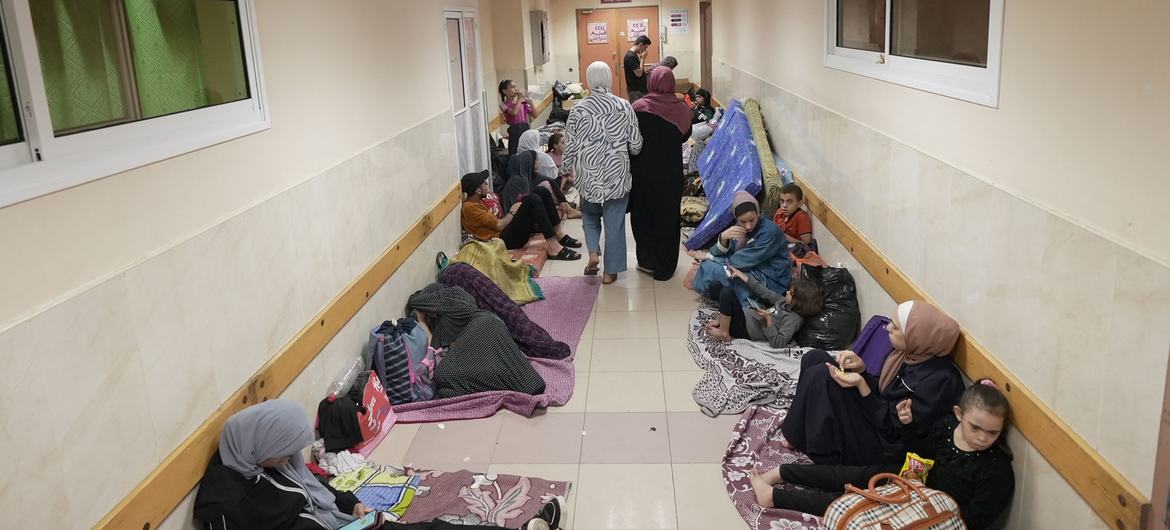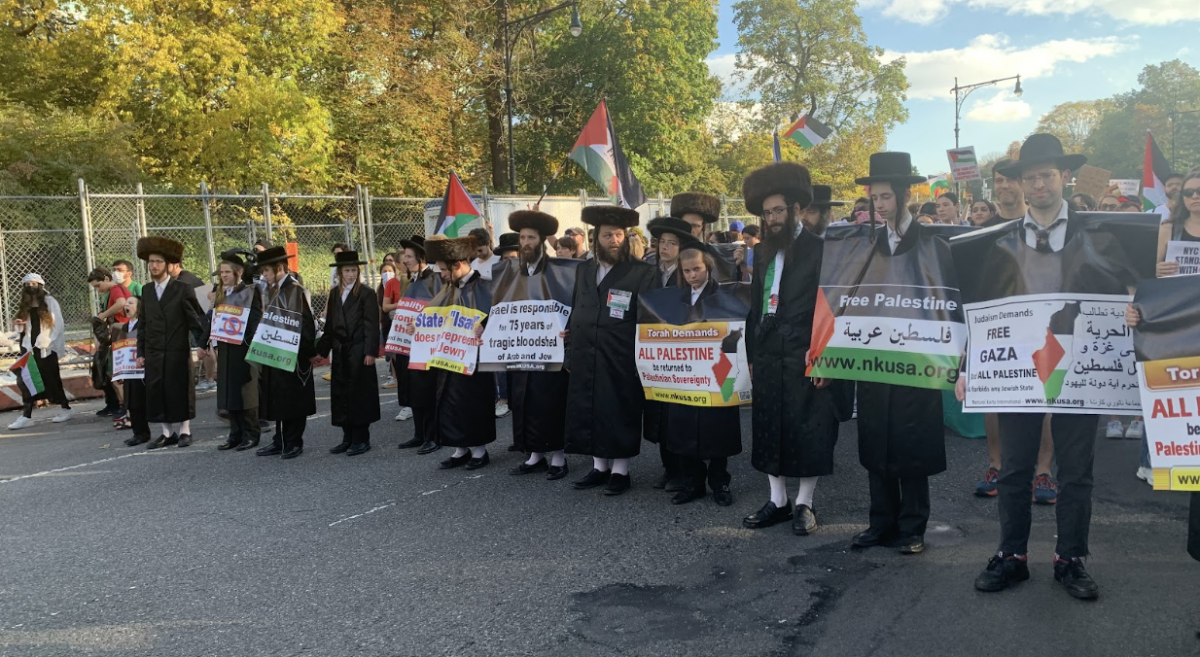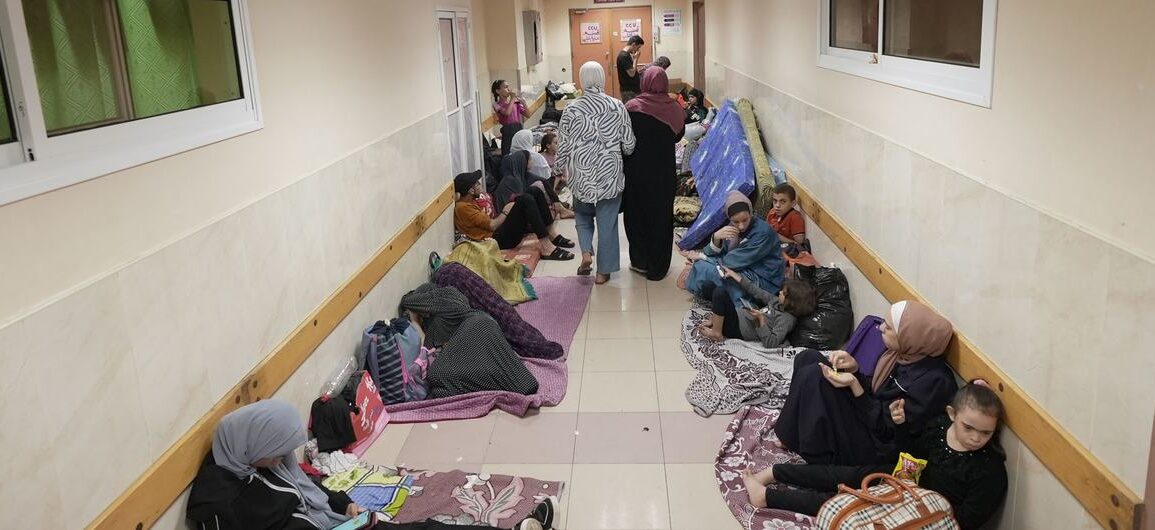Israel’s mass murder in Gaza, part of the Palestinian homeland, is unique and permits none of the distraction of comparison with other crimes against humanity. Global civil society is aware of this and recognises that silence is complicity. Governments have either remained paralysed by indecision or joined the chorus of acclaim for Israel. Civil society for all its global reach in the campaign for Palestinian rights, is yet to make a dent in the undeclared alliance of power against the popular will.
Except for a handful that broke off diplomatic contacts, governments are powerless because the US from its self-assigned perch as arbiter of neo-colonialist global law, is unequivocal in support of Israel. A month into the bombardment of Palestinian life, US President Joe Biden was asked about the possibilities of a ceasefire. “None, no possibility,” he deadpanned. A pause could perhaps be mandated, but only to secure the release of the captives taken by Palestinian militants in their audacious October 7 raid into southern settlements in Israel.
Now an active patron of two wars in distinct theatres – aside from low-level conflicts across the globe the US plays sides in – Biden is unabashed about his double standards. His special assistant in the National Security Council, John Kirby was weepy and maudlin on live TV when speaking of civilian suffering in Ukraine, as also the casualties Israel suffered on October 7. About civilian casualties among the Palestinians, he was brusque and business-like. The US would lay down no “red lines” for Israel’s operations, Kirby said, a response reminiscent of the “stuff happens” comment from US defence secretary Donald Rumsfeld (as he then was) after the invasion of Iraq in 2003 and that country’s descent into blood mayhem.
Biden visited Israel ten days into the conflict. The Al Ahli Baptist Hospital in Gaza had just been bombed, and his response was a sporting metaphor: “based on what I’ve seen, the other team must have done it, not you”, he said sitting across from Israel’s far-right Prime Minister Benjamin Netanyahu. Dissembling was the theme after his return home, when he brushed off the toll of deaths and injuries put out by Gaza’s health ministry as implausible.
Biden emboldened further outrages. In the days that followed, Israel attacked every healthcare facility in Gaza, ambulance convoys, schools, mosques and churches, with lethal force. The repeated bombardment of refugee camps under the UN administration was called out as a war crime, but this unequivocal finding by observers on the ground gained no official endorsement from global watchdog bodies such as the International Criminal Court or the UN Security Council.
On November 13, the Israeli army’s spokesman took embedded reporters on a tour of the bombed-out shell of the Rantisi Hospital in Gaza. He pointed to a chalkboard written in Arabic, alleging it was a duty roster for the militant resistance organisation Hamas. The claim was debunked at first glance: the chalkboard did nothing more sinister than list the days of the week in the Arabic script.
The following day, when Israel’s invasion force stepped up the ferocity of its attack on the Al-Shifa Hospital, Gaza’s largest health facility and the last to retain a level of serviceability, it claimed to be carrying out a “precise and targeted” operation against armed Hamas fighters sheltering behind the protection afforded by the hospital. The US asserted that it had evidence proving the Israeli case. No third party stepped up to endorse the claim, neither was any allowed in to verify. The Israeli onslaught went on regardless.
What would be the obligations of global watchdog bodies, which have shown great alacrity in bringing indictments against soft targets? There is a framework of legal obligations global players are expected to honour, a crystallisation of the learning experiences of the “civilised West” after it dragged the world through two rounds of industrial-scale bloodshed in the first half of the 20th century. These were embedded in the Geneva Conventions and related global covenants. The fourth of the Geneva Conventions (GCIV) and the First Additional Protocol are of particular relevance, since they deal with the protection of civilians in armed conflict.

Al Shifa hospital is being used as shelter for displaced families in Gaza. Photo: WHO
Among the rules applicable in all forms of conflict, irrespective of the status of belligerents as state or non-state actors, is Article 33 of the GCIV, which prohibits “collective penalties and likewise all measures of intimidation or terrorism”. This is followed by an entire section on “Occupied Territories” with no fewer than fifteen articles. Among these is one (Article 55), which makes it the duty of the Occupying Power to ensure “the food and medical supplies of the population”, and in particular, to “bring in the necessary foodstuffs, medical stores and other articles if the resources of the occupied territory are inadequate”.
Immediately afterwards is the stipulation (Article 56), that the maintenance of “medical and hospital establishments and services, public health and hygiene in the occupied territory” is an obligation of the Occupying Power, “with the co-operation of national and local authorities”.
Israel has in the past, argued that it is not bound by the Geneva Conventions in any of the occupied territories because there was no sovereign power supplanted by its military conquest. Military lines of control were drawn at Gaza and the West Bank in 1948, after hostilities between Israel and the Egyptian and Jordanian armies ended. Israel merely replaced one form of military administration with another in 1967, when it rolled into Gaza and the West Bank after blitzing the Arab armies in the Six-Day War.
This perspective has been rejected by every expert body since the language of the Geneva Conventions creates no such distinction. Its protections rather, are extended to all persons who “at a given moment and in any manner whatsoever, find themselves, in case of a conflict or occupation, in the hands of a Party to the conflict or Occupying Power of which they are not nationals”.
Israel has since added another element to its ideological armament, with the claim that after its withdrawal of all military deployments and settlements in 2004, the situation in Gaza ceased to be one of occupation, since it is no longer in “effective control”. The reality is that Israel has absolute control over all routes of access to the strip through air, land and sea, has maintained a powerful military presence at Gaza’s border with Egypt, and repeatedly intervened by military means, massively and at times of its choosing. In 2007, it fomented a series of pitched battles between Hamas and the rival resistance group Fatah, in an effort to overturn the result of the Palestinian National Council election of 2006, which the former had won. Effectively splitting the two and confining Hamas to Gaza, Israel ratcheted up the severity of its blockade of the territory.
Israel justifies the blockade on the grounds that it is engaged in an armed conflict with Hamas. In 2010, when a Turkish ship bringing essential food and medicines approached Gaza’s shores, it was interdicted by an Israeli naval task force. Commandos forcibly boarded the ship and killed nine peace volunteers, claiming the alibi that they met with violent resistance. Israel argued before a formal inquest that it was in a state of war with Gaza which made its blockade legal and its interdiction of the Turkish ship a permitted action.
The GCIV stipulates that warring parties will not use deprivation of the basic necessities of civilian life as a weapon of war. Article 23 requires all contracting parties to “allow the free passage of all consignments of medical and hospital stores, … essential foodstuffs, clothing and tonics intended for children under fifteen, expectant mothers and maternity cases”. Article 70 of the First Additional Protocol requires that in the event that “the civilian population of any territory under the control of a Party to the conflict, other than occupied territory … is not adequately provided …. relief actions which are humanitarian and impartial in character and conducted without any adverse distinction shall be undertaken, subject to the agreement of the Parties concerned in such relief actions”.
Israel is in clear and material breach of these stipulations, even in a declared state of war, and even if its denial of the status of an Occupying Power were to be accepted. This has never been a secret from the global community. The purpose of the blockade was put with absolute clarity by an adviser to Israel’s prime minister in 2009: it was “to put the Palestinians on a diet, but not to make them die of hunger”. Israel also has claimed that the blockade on Gaza is a form of legitimate “economic warfare”.
An official document noted in 2010 that Israel’s blockade of Gaza conformed with the principle that “a country has the right to decide that it chooses not to engage in economic relations or to give economic assistance to the other party to the conflict, or that it wishes to operate using ‘economic warfare’” (Yearbook of International Humanitarian Law, 2010: 402-03). In 2011, a cable unearthed by Wikileaks has Israel informing the US that its object was to keep the “Gaza economy functioning at the lowest level possible consistent with avoiding a humanitarian crisis”. To achieve this goal, Israeli officials employed “mathematical formulas to monitor foodstuffs and other basic goods entering the Strip to ensure that the amount of supplies entering was neither less nor more than the (permitted) amount”.
These privations are imposed on Gaza with the object of creating unbearable stresses in society. With a sufficient accumulation of such stresses, Israel believes, Gaza would be compelled to evict Hamas from all positions of authority. This puts Israel flagrantly in violation of the law of armed conflict, since the enforced suffering of civilians cannot be used as a means of achieving political and military objectives.
Perversely, the larger political context creates an incentive for Israel to sustain the blockade indefinitely, irrespective of any expression of peaceable intentions on the other side. Gaza has long since been banished from Israel’s territorial ambitions. It is seen as unmanageable, just too minute a territory with many more people than Israel can deal with. Israel’s territorial aims today include in the near future, the annexation of a substantial part of the West Bank. Keeping Gaza in in a permanent state of global ostracism and blockade, serves its purposes very well.
If Israel was already in a declared state of war with Gaza till the morning of October 7, the events that day were obviously part of a continuum. UN secretary general Antonio Guterres did no more than point this out, when he set off a frisson of faux outrage from the Israeli ambassador to the world body, who called on him to resign and announced that all cooperation with its agencies would cease. That is yet another instance, one among an infinite number, when Israel has used bluster and bullying, with the connivance of the US, to force certain themes off the global dialogue.
Even as the demonstrators who refuse to vacate the streets bear testimony to the manifest failure of this strategy, certain curiosities endure. If Israel was already in a war with Gaza, why was the declaration or the renewal of such a state on October 7 necessary? And in the context of a war that was already underway, how were Hamas’s actions of October 7 to be viewed? To add to these curiosities, Israel that day sought in a noisy, obstreperous clamour of self-righteousness, the right to defend itself against a people it had placed on a blockade and kept on the verge of starvation as a matter of policy.

Members of the orthodox Hasidic Jewish community lead the call for ceasefire in Gaza, Brooklyn, NY, Saturday, October 29. Photo: Sunita Viswanath
The term “terrorism” applied to the October 7 attacks has empowered Israel’s grossly disproportionate response under a dangerously vague and open-ended mission of “eliminating” Hamas for all time. The First Additional Protocol by Article 1(4), extends all the protections of the Geneva Conventions to peoples “fighting against colonial domination and alien occupation and against racist regimes in the exercise of their right of self-determination”. This has been read, though not without controversy, as the legally enshrined right of an occupied people to assert their right to self-determination by armed means. Armed resistance is legitimate where necessary, though within the universally applicable norms of proportionality and military necessity.
“Proportionality” is a difficult parameter to estimate in all circumstances. But when weighed in the scale of Israel’s history of occupation and blockade, and the massive military operations it has carried out in Gaza prior to October 7, it becomes virtually impossible to quantify. Leaving that aside, it is a fact that video records from that day, reviewed by respected global rights bodies, have provided undeniable evidence of war crimes, warranting an investigation by the International Criminal Court.
Proportionality in the application of international legal norms would then require an investigation of Israel’s conduct, both before and after October 7. And Israel has very early on, signalled its utter disdain of every norm, with its deliberate policy of bombing entire neighbourhoods out of existence, its order for the relocation of Gaza’s residents, and its attacks on hospitals after serving brief notice for their evacuation.
Amid the very visible evidence of mass murder, there has been a call for the nuclear bombing of Gaza by an Israeli cabinet minister, Amihai Eliyahu. He earned a reprimand from Israel’s prime minister, perhaps more for the public revelation of Israel’s clandestine nuclear arsenal than for the genocidal intent. Avi Dichter, another cabinet minister, spoke of the ongoing operations as the “Gaza nakba”, or catastrophe, an Arabic term used to describe the mass displacement of Palestinians that accompanied the creation of Israel in 1948. When questioned about this assertion, Mark Regev, an adviser to the Israeli prime minister embraced the sentiment, ascribing all the blame, as he put it, to irresponsible Palestinian leadership.
A number of special rapporteurs and independent experts retained by the UN for their special expertise have meanwhile, warned that Israel’s words and deeds express an overt genocidal intent:
“We are deeply disturbed by the failure of governments to heed our call and to achieve an immediate ceasefire. We are also profoundly concerned about the support of certain governments for Israel’s strategy of warfare against the besieged population of Gaza, and the failure of the international system to mobilise to prevent genocide.”
This is followed by a call to action:
“The international community, including not only States but also non-State actors such as businesses, must do everything it can to immediately end the risk of genocide against the Palestinian people, and ultimately end Israeli apartheid and occupation of the Palestinian territory.”
International law is of course an imperfect instrument to enforce the will of the global community. With all its ambiguities, the Geneva Conventions are the best available guide to how the world should be, not to how the world is. In reality, the law is what the powerful say it is. An ancient adage resurfaced by the historian E.H. Carr in his classic critique of the theory of international relations puts it best: justice is the right of the strong. Now, more than ever, is a time when international civil society has to agitate for the right to be heard by ruling establishments. Global demonstrations demanding that Israel be held accountable have not shown any sign of fatigue, despite the forces arrayed on the other side, and the application of draconian new laws to silence their voices. That is perhaps the sole bright spot in a bleak global scenario.
Sukumar Muralidharan is an independent writer and researcher based in the Delhi region. He has worked in print media, as a journalism instructor and trainer, and press freedom campaigner.
This post was originally published on this site be sure to check out more of their content.









